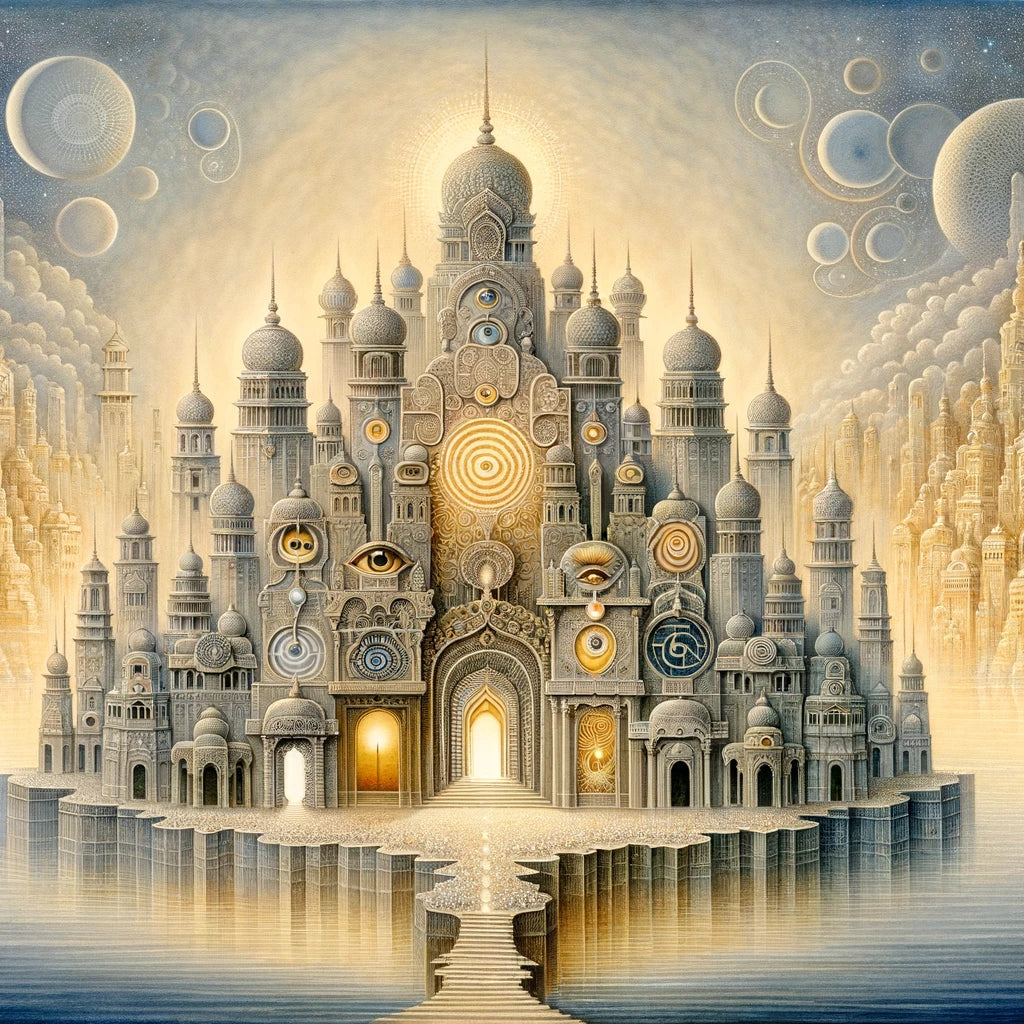A Late-Night Encounter with "The City of Eleven Gates": When Ancient Wisdom Crashes Our Modern Party

Last night, nestled comfortably in my favorite armchair, (with a bag of Chips and favourite Elixir), I embarked on an auditory journey through the ancient wisdom of the Upanishads, courtesy Eknath Easwaran's "Essence of the Upanishads" on Audible. The chapter titled "The City of Eleven Gates" caught my attention, transforming my quiet evening into an insightful expedition into the depths of spiritual understanding. There I was, headphones in, the world tuned out, ready to dive headfirst into the metaphysical insights of age-old texts, feeling slightly guilty for choosing this over my usual podcast binge. But Pun apart, It felt like finding a secret passage in my backyard leading straight to a treasure trove of existential insights.
The City of Eleven Gates: Blueprint metaphore by Upnishads
In the profound teachings of the Upanishads, the "City of Eleven Gates" emerges not just as a metaphor but as a vibrant blueprint of the human body, depicted as a sacred city with eleven openings. These gateways include the two eyes, two ears, two nostrils, the mouth, two lower openings, the navel, and, significantly, the subtle eleventh gate at the crown of the head. This last gate is revered as a mystical portal, believed to be the passageway through which the soul can ascend from the physical realm and merge with the infinite expanse of cosmic consciousness. This vivid allegory from the ancients serves as a call to mindfulness, a reminder to be discerning about our engagements with the external world. By understanding the nature and purpose of these eleven gates, we are invited to refine what we absorb and what we emit, fostering a life that is not just lived but deeply experienced, a journey marked by wisdom, understanding, and spiritual elevation.
A Modern Metropolis of Sensory Overload
Imagine your life as a bustling metropolis, with information highways crisscrossing, filled with the constant hum of social media notifications, the aroma of microwave dinners, and the glow of binge-watched series. This modern city has gates wide open, welcoming every tweet, snack, and Netflix series with open arms. The Upanishads, through the lens of a sleep-deprived reader like me, present an intriguing urban planning model - the body as a city with eleven gates, not for traffic congestion, but for managing the sensory overload. Puram ekaadasha dvaaram, as the texts say, pointing to a blueprint for navigating life's hustle without losing our minds.
Channel Surfing Through the Gates
As I munched on my chips, I couldn't help but marvel at how these ancient scriptures seemed to understand our modern dilemma of endless channel surfing, both digital and cerebral. The Upanishads, with their age-old wisdom, suggest that perhaps it's time to install some traffic lights at these gates. Maybe it's not the best idea to have pizza delivery on speed dial or to consider the couch our primary place of worship.
From Mindless Consumption to Mindful Reflection
The chapter nudely hints at turning our attention inward, swapping mindless consumption for mindful reflection. Imagine sitting down to meditate and instead of achieving nirvana, you find yourself compiling a grocery list in your head. Yet, there's hope for us yet in these ancient texts, urging us to slow down, chew our food (and our thoughts) properly, and maybe, just maybe, find enlightenment somewhere between our morning coffee and our nightly Instagram scroll.
Applying Ancient GPS to Our Daily Gridlock
How do we apply this ancient GPS to our daily gridlock? It starts with mindfulness - perhaps meditating for a few minutes before automatically reaching for our phones in the morning. Or considering if we really need to watch another episode before bed. It's about choosing what we let into our city - opting for nourishment over noise, for connection over congestion.
The Ultimate Life Hack: Ancient Wisdom in Modern Times
As I delved deeper, I realized that these ancient texts are the ultimate life hack for the modern soul, offering a way to declutter our internal city, guiding us toward a life of purpose and presence. The Upanishads don't just offer escape routes from our self-made chaos; they offer blueprints for rebuilding, for creating a sanctuary where peace and purpose can flourish amidst the noise.
Conclusion: A Toast to Mindful Living
As the sun rose, and my chip bag lay empty, I couldn't help but feel a sense of connection to these ancient teachings, a roadmap for navigating the complex cityscape of modern life. So, here's to installing some traffic lights at our gates, to mindful munching, and to finding the sacred in the everyday. And if you're looking to wear your newfound wisdom on your sleeve (or chest), check out the cool, conversation-starting designs at IndiPeepal. Who knows? Your next fashion statement might just spark a dialogue about the timeless wisdom of the Upanishads, dressed in the casual flair of modern life.
In the end, as I closed the book and turned off the lights, a Sanskrit śloka whispered in the silence, Tamasoma Jyotirgamaya – from darkness, lead me to light. Maybe, just maybe, the first step out of our self-created shadows is through the city of eleven gates.
























Brother,
Awesome article…
Amazingly fresh reading.
Love